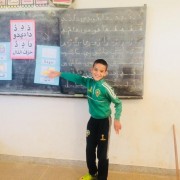Speeches Shim

In order to offer blind and visually impaired youth access to Career Center services, the USAID Career Center program equipped the six pilot career centers with the equipment that allows blind and visually impaired users to access computers and ease their navigation through the Virtual Career Center.
Morocco is the United States’ oldest friend in the Middle East and North Africa. This bond, which dates back over 200 years, is forged on a solid foundation of our shared values in security, freedom, and prosperity. Located in an increasingly unstable and volatile region, Morocco continues to set itself apart with its stability and steadily growing economy.

In order to address a gap in soft skills and support new recruits to successfully integrate into the company, Richbond, a Moroccan furniture manufacturer, partnered with the Vocational Career Center in Casablanca to train youth in soft skills essential to the work environment. Through this collaboration, Richbond management aimed to recruit some of the best junior profiles from this group, who participated in trainings that strengthened core non-technical skills such as teamwork, basic rules in the workplace, values and goals, and oral communication.

Eleven-year-old Ayoub is smiling, reading and playing games with his classmates, just like any child his age. However, this seemed out of reach just a few years ago. Ayoub suffers from a condition called dyspraxia, a neurological disorder that makes it difficult to process motor tasks.
Around the world, children with disabilities, just like Ayoub, are often denied the right to quality education. Of the 150 million children with disabilities globally, an estimated 90 percent are out of school.
In 2015, USAID partnered with the Ministry of National Education, Vocational Training, Higher Education and Scientific Research to launch the 30-month Reading for Success – Small-Scale Experimentation activity to develop and test the most effective approaches to strengthen students’ Arabic reading skills in targeted primary schools. With the positive results from the pilot phase, and building on the data, evidence, and lessons learned, the Ministry of Education decided to implement this approach in grades one through four in all public elementary schools nationwide.


Comment
Make a general inquiry or suggest an improvement.